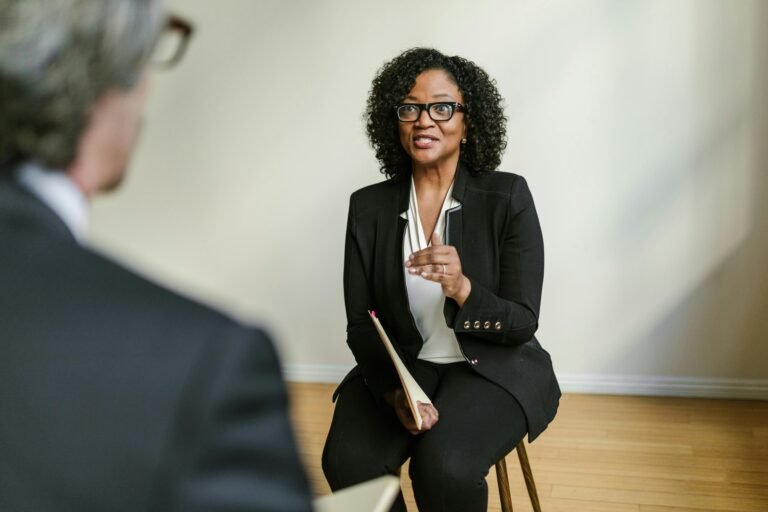Before you step into your next interview (or your next opportunity) it’s worth taking a moment to pause and look inward. Whether you’re a teacher, support staff member, or school leader, this self-reflection worksheet is here to help you prepare in a way that goes deeper than practicing answers or polishing a resume. It’s about slowing down, looking inward, reconnecting with your purpose, and preparing for your interview in a way that’s grounded, honest, and confidence-building. Use it to uncover meaningful stories, highlight your growth, and connect your experience with the role you’re applying for.
This isn’t a quiz. There are no “right” answers here, just honest and real ones. Think of this as a quiet, thoughtful space to get to know yourself better by exploring:
- Why you do this work
- How you’ve grown
- What you bring to a school community
- And how you want to show up in this next chapter
You can move through the sections at your own pace. Use the prompts to jot down ideas, recall meaningful stories, and gather clarity about who you are as an educator, support professional, school leader, and colleague.
Pre-Interview Self-Reflection Worksheet
Section 1: Your “Why”
Knowing your purpose helps you speak with clarity and confidence. Most interview questions connect back to what motivates you and how aligned you are with the school’s mission.
- Why did you first choose to work in education or a school setting?
- What continues to motivate you to stay in this field?
- What values shape the way you approach your work with students or colleagues?
- What kind of school environment helps you thrive—and why?
- Why are you interested in this specific role or school?
Section 2: Growth & Learning
Schools look for professionals who reflect, adapt, and grow. Sharing your learning journey shows that you’re self-aware and committed to improving your practice.
- Describe a time you made a mistake or faced a challenge. What did you learn from it?
- What’s a piece of feedback that helped you grow? How did you respond to it?
- In the last year or two, what’s something you’ve improved in your work?
- Is there a professional goal you’re working on right now? What steps are you taking?
- What has shaped your approach to equity, inclusion, or supporting diverse learners?
Section 3: Skills in Action
Many interview questions will ask for real examples of how you work with students, solve problems, or lead. Reflecting ahead of time helps you share stories that stick.
- Tell a story about a time you made a positive impact on a student, colleague, or the school community.
- Describe a situation where you had to solve a problem quickly or under pressure. What was the outcome?
- How do you handle collaboration—especially with people who have different styles or perspectives?
- What’s an example of a time you showed leadership, even in a non-leadership role?
- What’s a project, initiative, or small win that you’re especially proud of?
Section 4: Communication & Connection
Whether you’re teaching, managing a front office, or supporting operations, schools value people who can build relationships and communicate with empathy.
- How do you build strong relationships with students, families, or colleagues?
- How do you adapt your communication for different audiences (students, staff, parents, etc.)?
- Describe a time when you resolved a conflict or helped someone feel heard.
- What does being a “team player” look like to you in a school setting?
Section 5: Vision for the Role
This is your opportunity to show the hiring team how you think, what you value, and how you’ll contribute to the school.
- What strengths make you a strong fit for this position?
- How do your values show up in your day-to-day work?
- What do you hope to bring to this school community?
- What would success look like for you in this role—one year from now?
- What are you most excited to learn or grow in next?
Using AI Thoughtfully, but not as a Shortcut
AI tools (like ChatGPT, CoPilot, Deepseek, or Gemini) can be incredibly helpful once you’ve completed your self-reflection. They can help you:
- Turn your rough notes into clear talking points
- Practice mock interview questions
- Polish the wording of your stories or insights
- Brainstorm ways to explain your experience in plain, professional language
But here’s the key: Don’t let AI do the reflecting for you.
Hiring teams can tell when answers feel overly polished, generic, or disconnected. What sets you apart is your real voice—your values, your learning, your lived experience. AI should support your process, not replace it.
Use tools to refine your thinking, and not to erase it.
In Closing: Interviews Are Conversations, so be Sure to Let Your Reflection Lead
If you’ve taken the time to work through this, you’ve already done meaningful preparation. You now have stories, insights, and a clearer sense of what makes you, you.
As you prepare for your interview:
- Speak from experience, not a script
- Be honest about your growth and goals
- Let your values and voice come through
Because in schools, people don’t just hire resumes, they hire reflective, compassionate professionals who are in it for the right reasons. Best of luck as you continue to prepare for your interview!
Related Posts
What to Say and What Not to Say About a Previous Employer
How to Conduct a Self-Assessment to Identify Your Strengths and Weaknesses
Why You Should Never Criticize a Former Employer During a Job Interview
5 Strategies for Turning a Negative Job Experience into a Positive Interview Discussion
10 Body Language Tips to Improve Your Virtual School Interview Presence









